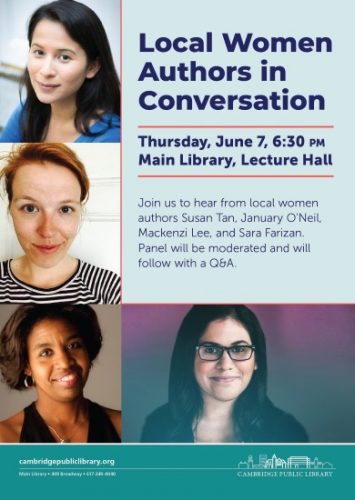
Find more great Horn Book content at these links:
Recommended books: reviews and themed booklists
App and e-book reviews
Movie reviews
Event news and recaps
Events calendar
Local Women Authors in Conversation at the Cambridge Public Library
Last week the Cambridge (MA) Public Library hosted a panel of Local Women Authors in Conversation.
 Last week the Cambridge (MA) Public Library hosted a panel of Local Women Authors in Conversation. Moderated by Professor Susan Tomlinson of the University of Massachusetts, Boston, and editor of the scholarly journal Legacy: A Journal of American Women Writers, the panelists were middle-grade writer Susan Tan (author of the Cilla Lee-Jenkins books and Horn Book Magazine: Special Issue: Humor jokester), YA author Sara Farizan (Tell Me Again How a Crush Should Feel; If You Could Be Mine), and poet January O'Neil, executive director of the Massachusetts Poetry Festival. The event came about in large part due to the efforts of adult author Celeste Ng (Little Fires Everywhere) whose urging of the library to replace their canceled Junot Díaz event with one celebrating women authors came to fruition in record time.
Last week the Cambridge (MA) Public Library hosted a panel of Local Women Authors in Conversation. Moderated by Professor Susan Tomlinson of the University of Massachusetts, Boston, and editor of the scholarly journal Legacy: A Journal of American Women Writers, the panelists were middle-grade writer Susan Tan (author of the Cilla Lee-Jenkins books and Horn Book Magazine: Special Issue: Humor jokester), YA author Sara Farizan (Tell Me Again How a Crush Should Feel; If You Could Be Mine), and poet January O'Neil, executive director of the Massachusetts Poetry Festival. The event came about in large part due to the efforts of adult author Celeste Ng (Little Fires Everywhere) whose urging of the library to replace their canceled Junot Díaz event with one celebrating women authors came to fruition in record time.Discussion began with how each panelist became a writer. Sara talked about going from writing to thinking of yourself as a writer; she also made the point that yes, she needs health insurance so yes, she has a day job. January, who is the mother of two adolescents, wrote "terrible song lyrics" as a child; she now thinks of poetry as her "center...it's like my family, it's always there." Susan wrote in secret, in bed, on her laptop at night while studying children's literature ("'Oh! We didn't know you wanted to be a writer," said her friends and classmates).
All three talked about identity and representation, and about both the huge pressure and immense rewards they can bring. Sara and Susan write the books they wish they'd had as children. Sara was "out and proud" as the daughter of Iranian immigrants but closeted about her sexuality ("I knew I liked Belle and not Gaston, and not just because Gaston was a terrible person"). Susan is biracial (of Chinese and Caucasian descent), and has a visceral memory of the first time she saw herself in a book: "I sat down on the floor of the library and started reading right there." She doesn't mind when people call the Cilla Lee-Jenkins books "trope-y" ("Everyone deserves that sort of everyday-kid story"); and she regularly receives hugs and drawings, and even a marriage proposal ("If I was forty, I'd marry you!").
During the Q&A, I asked a question about the term "women's writing" as a way to dismiss writing by women, on the one hand, and a way to self-identify and encourage inclusion of more and new voices, on the other. This sparked a great discussion about who is doing the defining and the labeling and why and how that can change. For Susan, you've got to change who's there. For Sara (just coming from a romance writers' gathering), it's about self-advocacy and who supports you. For January, it's about finding your community and expanding it.
The talk ended with a question about book recommendations. Sara talked about Jacqueline Woodson, Malinda Lo, and Meredith Goldstein (from The Boston Globe, who was in the audience), Tommy Orange's There There, and the books of Chris Lynch (who was Sara's mentor). Susan suggested the Jasmine Toguchi series, Gene Luen Yang's books, and Rick Riordan's new imprint dedicated to the mythology and folklore of underrepresented cultures. January chose Citizen: An American Lyric by Claudia Rankine; Captain's Log: Snowbound, Erin Dionne's upcoming picture book about being stuck inside during a snowstorm; and Terrance Hayes's American Sonnets for My Past and Future Assassin.
The circumstances behind this panel's genesis and the particulars of its composition were not the main focus of the evening; yet the power behind the facts of who was (and wasn't) in those chairs spoke volumes. For more thought-provoking discussion on women in the publishing industry, visit facebook.com/kitlitwomen.
![]()
RELATED
RECOMMENDED
ALREADY A SUBSCRIBER? LOG IN
We are currently offering this content for free. Sign up now to activate your personal profile, where you can save articles for future viewing.







Add Comment :-
Be the first reader to comment.
Comment Policy:
Comment should not be empty !!!